VP Day 80 Years On - Our Area Remembers, Honours Those Who Served
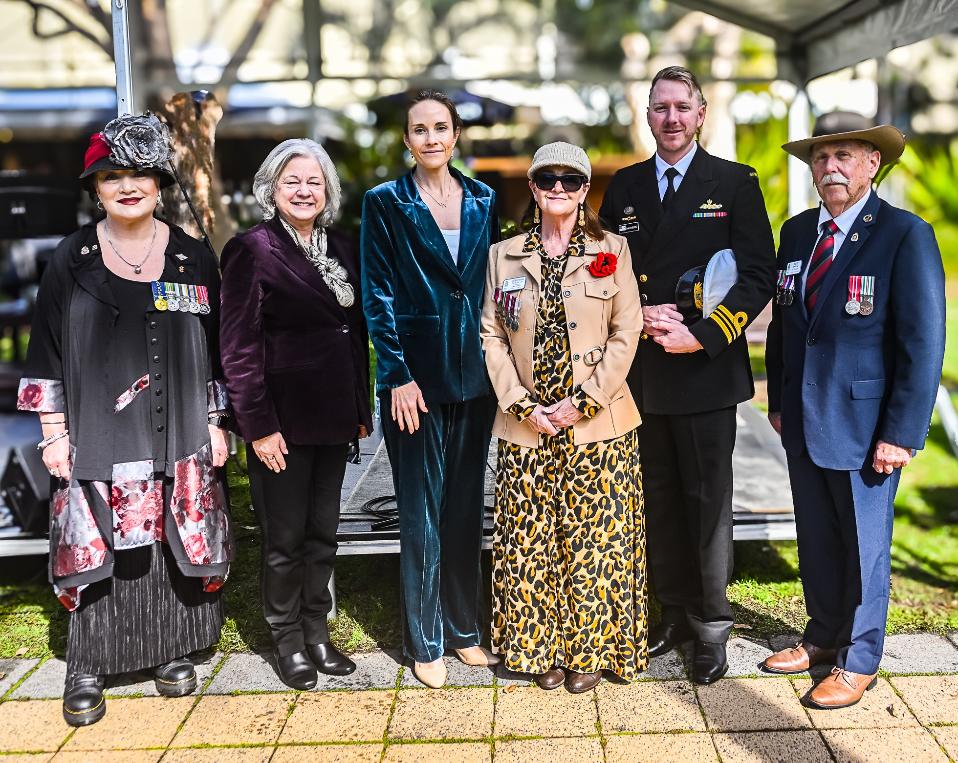
RAN Lieutenant Commander Tamara Sloper-Harding OAM, Vice-President Avalon Beach RSL Sub-Branch, Mayor Sue Heins, Pittwater MP Jacqui Scruby, Deborah Carter, President Pittwater RSL Sub-Branch, Commemoration Address: LCDR Shaun Mendez RAN, HAMS Waterhen, Terry Jones, Vice-President Pittwater RSL Sub-Branch. Photo: Michael Mannington OAM, Community Photography.
Avalon Beach RSL Sub-Branch hosted a combined RSL and Community Commemoration for Victory in the Pacific Day on Friday 15th August 2025, with a Commemoration Service around the Cenotaph.
The Service, led by Vice President Tamara Sloper-Harding, OAM, with the Commemoration Address given by LCDR Shaun Mendez RAN, HAMS Waterhen, honoured those who served in this conflict and paid tribute to those who serve Australia still across the RAN, RAAF and Australian Army.
VP Day marks the day when news of Japan’s surrender signalled the end of the Second World War for Australia.
Pittwater MP Jcqui Scruby, who attended services at Narrabeen RSL village and the combined RSL Sub-Branches service at Avalon, Stated:
''August 15 2025 marks 80 years since the Victory in the Pacific and the end of WWII.
I’m forever grateful for the brave soldiers who fought and I extend my deepest thanks to the families who supported them. Their sacrifice and resilience will never be forgotten.''
Sydney Cenotaph Commemorative Service
A large crowd gathered beneath a bright winter sky at the Sydney Cenotaph in Martin Place to mark the 80th anniversary of Victory in the Pacific (VP Day) on Friday 15 August.
RSL NSW hosted the commemorative service, which stood as both a formal remembrance and a moving celebration of peace, resilience, and the enduring service of Australia’s veterans.
This year’s milestone anniversary brought together members of the public, veterans’ families, community representatives, and dignitaries, alongside five of NSW’s last-surviving Second World War veterans.
Throughout the service, the historic banners of veteran associations stood proudly, a visual reminder of the links between Australia’s past and present.
The Royal Australian Navy Band Sydney played a stirring rendition of The Recessional and the national anthem as wreaths were laid to honour all who served, particularly the nearly one million Australians who enlisted between 1939 and 1945.
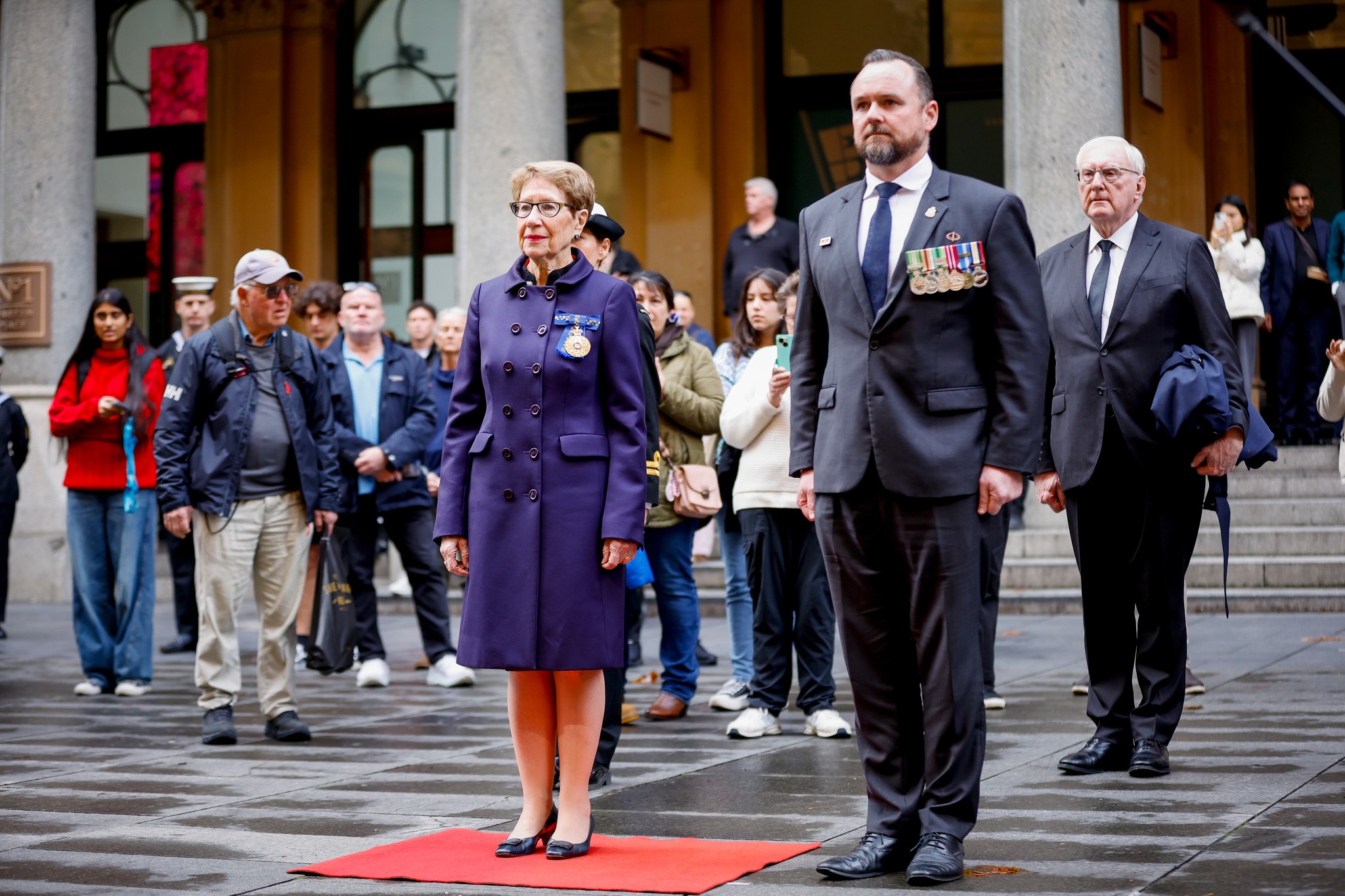
RSL NSW President Mick Bainbridge welcomes Her Excellency the Honourable Margaret Beazley AC KC to the VP Commemorative Service. Photo: RSL NSW
Those assembled paused to remember the more than 39,000 Australians who did not return home, the 66,000 who were wounded, and approximately 30,000 who were taken prisoner, two-thirds of whom endured captivity in the Pacific theatre.
Her Excellency the Honourable Margaret Beazley AC KC delivered the Commemorative Address, where she spoke about stories of courage, sacrifice, endurance and leadership.
“The camaraderie of soldiers, of engineers, pilots, squadron members, naval officers, seamen, shore signallers, code breakers, radar operators, nurses, medical personnel, all who worked together,” Her Excellency said.
“In many ways, it could not be better summed up than one of our centenarian veterans here today, who said ‘they were good mates, always there. We relied on one another.
“You know, no one went without the other. We’re all part of a team, you need a cook, you need an infantryman, you need everyone, everyone is needed.’”
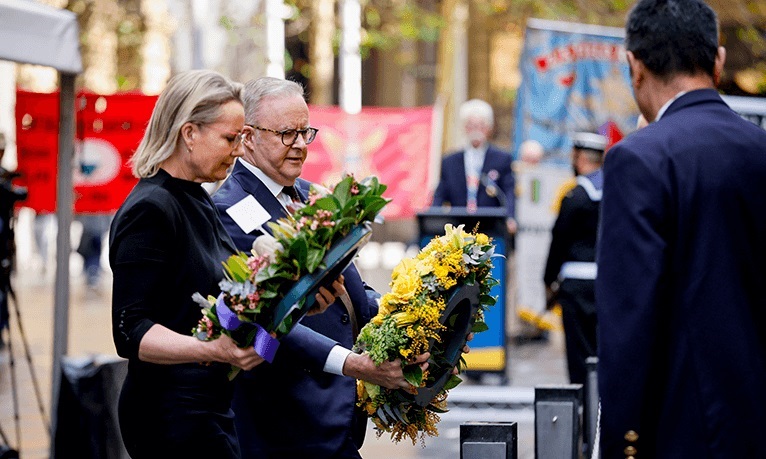
The Leader of the Federal Opposition Sussan Ley(left) and the Prime Minister Anthony Albanese (right) each laying a wreath at the 80th anniversary of VP Day. Photo: RSL NSW
The Prime Minister, The Hon. Anthony Albanese also attended the service. His VP Day 80 Years On Address:
80th anniversary of Victory in the Pacific
Address given by The Hon Anthony Albanese MP, Prime Minister of Australia
Friday 15 August 2025: Martin Place, Sydney
Eighty years ago, Prime Minister Ben Chifley began his address to the nation with a sentence of perfect simplicity – and infinite power:
Fellow citizens, the war is over.
The signing of the surrender was some weeks off, but the darkness that had engulfed the world – and made its last stand in the Pacific – was at last lifted.
Here in Sydney – as they did in towns and cities across Australia – crowds poured into the streets. They sang and danced amid a joyous blizzard of paper.
Chifley, who had seen his friend and predecessor John Curtin worn down by the gravity of war leadership, turned his words to all who had fought the darkness – but not lived to see the light.
"Let us remember those whose lives were given that we may enjoy this glorious moment and may look forward to a peace which they have won for us.
Let us remember those whose thoughts, with proud sorrow, turn towards gallant, loved ones who will not come back. … Nothing can fully repay the debt we owe them nor can history record in adequate terms their deeds".
Chifley spoke, too, of the home front, the men and women who had “performed miracles of production … so that the battle of supply could be won”.
Between us and that extraordinary day, eight decades now stretch. At this distance, the story of World War II has become set in our memories.
The Allied victory over tyranny has, in retrospect, taken on a feel of inevitability.
Part of the debt we owe to all who served our nation is to remind ourselves how close history came to taking a different path.
And to remember and honour every Australian – and every friend and every ally – who gave everything to ensure it did not.
Across Europe and North Africa.
Across Asia and the Pacific, and even across our own shores.
We think of all the stories of courage. Of resilience and exhaustion, of fear and elation, and an endless longing for the home that so many never saw again.
These are not stories rendered in bronze or marble, but written in flesh and blood.
Stories of ordinary people facing the extraordinary.
Facing loss, securing victory.
Stories of mateship tempered in the fire of combat.
We think of all we owe to every Australian who served in our name.
Every Australian who fell, and every Australian who came home but could never leave the battle.
Every family that felt the pride and weight of a loved one who put on the uniform. Every family that knew the grief that had no ending, only a beginning.
As we gather in the very place so many Australians celebrated that day, we reflect on what victory meant – and what it cost.
Every life and dream and future swallowed in that vortex of madness and cruelty, from every battlefield and every burning city, from the prisoner of war camps to the unprecedented horror of the concentration camps.
These were nightmares made real – not by monsters but by human beings in a grotesque perversion of humanity.
Yet, as we feel that weight, our hearts are lifted by every Australian who stood against it.
Amid the shadows of war, the power of their courage and the strength of their character is a light that is a beacon to us still.
They showed us what it is to remain true to ourselves, no matter what.
They showed us what it means to stand shoulder to shoulder with friends and allies.
And together, they turned the tide.
As we stand here today, think of everyone who gathered 80 years ago.
Think of the noise of their elation.
And, hanging in the air just beyond the sound of their happiness, the silence of those who never came home.
A silence that touched every corner of our continent, from the biggest city to the smallest country town.
As we do, we return to another sentence whose simplicity is matched only by its power:
Lest we forget.
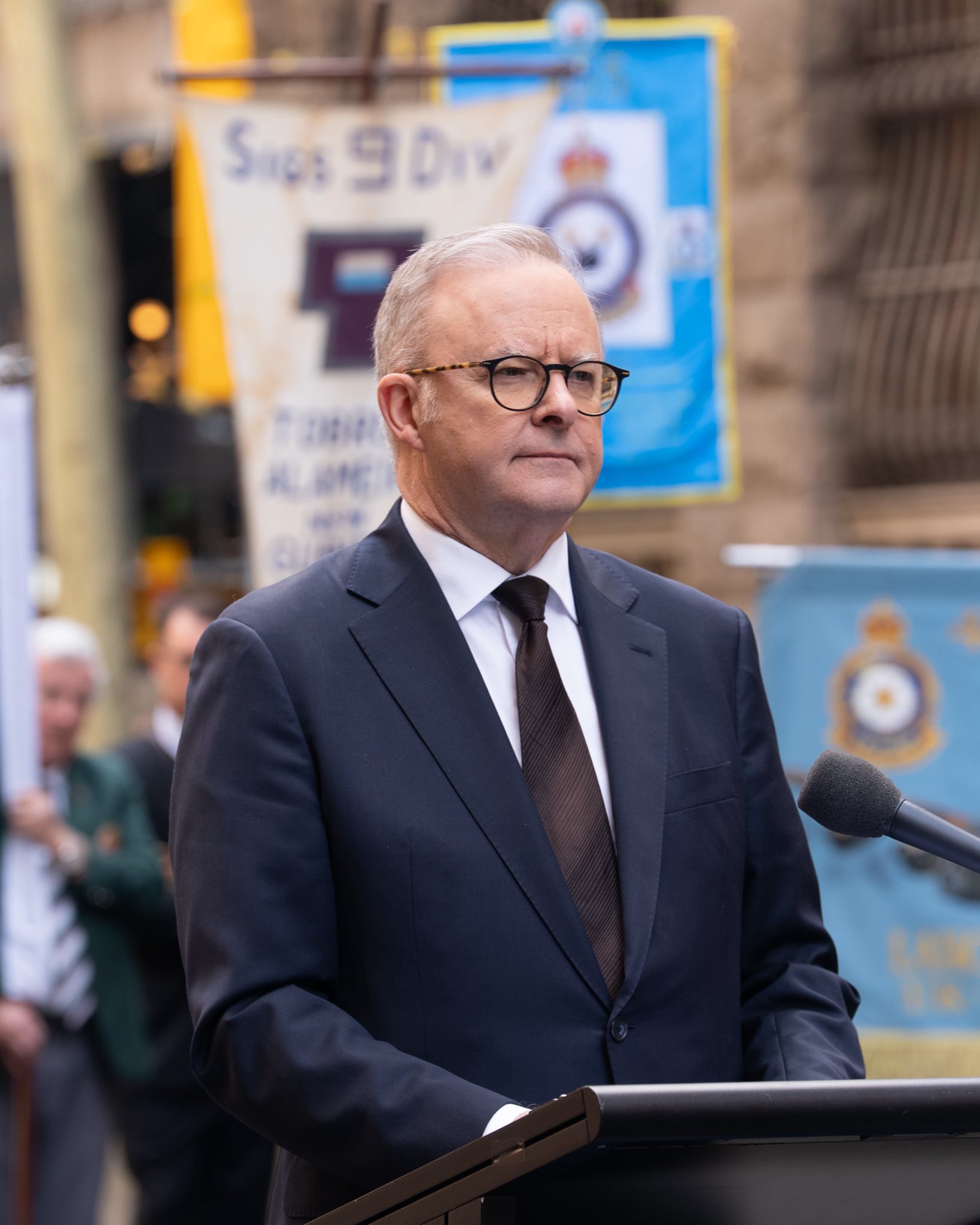
The Hon Anthony Albanese MP, Prime Minister of Australia. Photo: RSL NSW
__________________________
Moments of silence, the recitation of The Ode, and the sounding of the Last Post offered space for reflection and gratitude as the service wrapped up with the dismount of the Catafalque Party.
Attendees were also reminded that the conflict touched every corner of Australia, from attacks on cities and ships to the efforts of civilians supporting troops abroad.
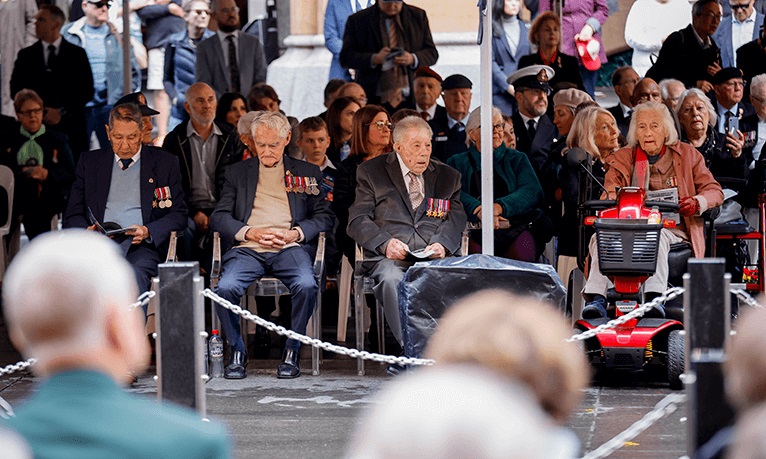
Four Second World War veterans, (L-R) Ron Gee Kee, Robert MacArthur, Edward Sankey and Grace Wood attended the 80th anniversary of VP Day service at The Cenotaph in Sydney. Photo: RSL NSW
As the service concluded, families and schoolchildren mingled with veterans to share stories, capture photographs, and reaffirm the promise to “never forget.”
For many, this 80th anniversary was not only an opportunity to reflect but a call to keep the spirit of service, remembrance, and unity alive for years to come.
The NSW Government commemorated this important anniversary of VP Day with a series of activities and events to honour the service of our veterans, their families and all who endured the war at home.
Descendants of Second World War veterans were being offered an exclusive opportunity to visit the Air Raid Shelters in the disused St James train tunnels beneath Hyde Park for a guided talk. The tours of the shelters deep below the CBD, includes an opportunity to explore the inscriptions etched on the walls by veterans and Sydneysiders who had hunkered underground when the air raid sirens sounded during the war.
For the first time, members of the public were able to get up close to a painstakingly restored searchlight, used 80 years ago to light up the skies around Sydney to identify enemy aircraft, on display this week at the northern forecourt of the Anzac Memorial in Hyde Park.
At 6:15pm on Friday, this magnificent piece of history again lit up the Sydney sky as a tribute to our Second World War servicemen and servicewomen, during a sunset VP Day commemoration at the Anzac Memorial.
.jpg?timestamp=1755382796615)
NSW Minister for Veterans, The Hon. David Harris and a 'Home Guard' member. Photo: NSW Government
A number of veterans of the Second World War have also shared their stories for an online showcase that is enabling current and future generations to continue to learn about their service and sacrifice. View the ‘Second World War Stories’ here: www.warmemorialsregister.nsw.gov.au/nsw-stories/theme/second-world-war-stories
Pittwater Online News insights for VP Day 80 Years On include:
- WEA's Newport Summer School – for Workers, WANS + Future U.S., B.P.F. Wives: Local Insights for The 80th Commemoration of VP Day in 2025
- Coastal Defences In World War Two: The Dee Why to Warriewood Sections
- Broken Section: The Story Of Pittwater's Anti-Submarine Boom Net - By John Illingsworth
- Avalon Beach SLSC During World War Two: The Police Boys Club Mans the Beaches
During the Second World War, Australian forces were engaged in campaigns across the Pacific – in New Guinea, Bougainville, New Britain, Borneo, and in the Philippines – and Australian prisoners of the Japanese were spread throughout Asia. While on the ‘home front’, women and children did all they could to help support the war effort and manage the heavy impacts it had on their lives.
For more information visit: www.anzacmemorial.nsw.gov.au/event/commemorate-80-years-victory-pacific
NSW Minister for Veterans, The Hon. David Harris, said:
“On Friday we came together on a special anniversary of VP Day to remember all the men and women who served during the Second World War, abroad in Europe and the Pacific, as well as those who served and the public who endured the war on the home front.
“We honour the nearly 1 million Australians who served, and the 39,000 Australians who made the ultimate sacrifice for the cause of peace and the freedom we enjoy to this day.
“We thank them for their sacrifices, through conflict and, for many, long periods in captivity. Their contributions helped keep us safe and our nation from further attack during a war that was fought so close to our shores.
“I encourage our community to remember the service of our veterans this week and particularly on Friday, and to visit the Anzac Memorial in Hyde Park and have a look at the searchlight currently on display that fired up for the first time in 80 years on Friday, to commemorate the anniversary.”
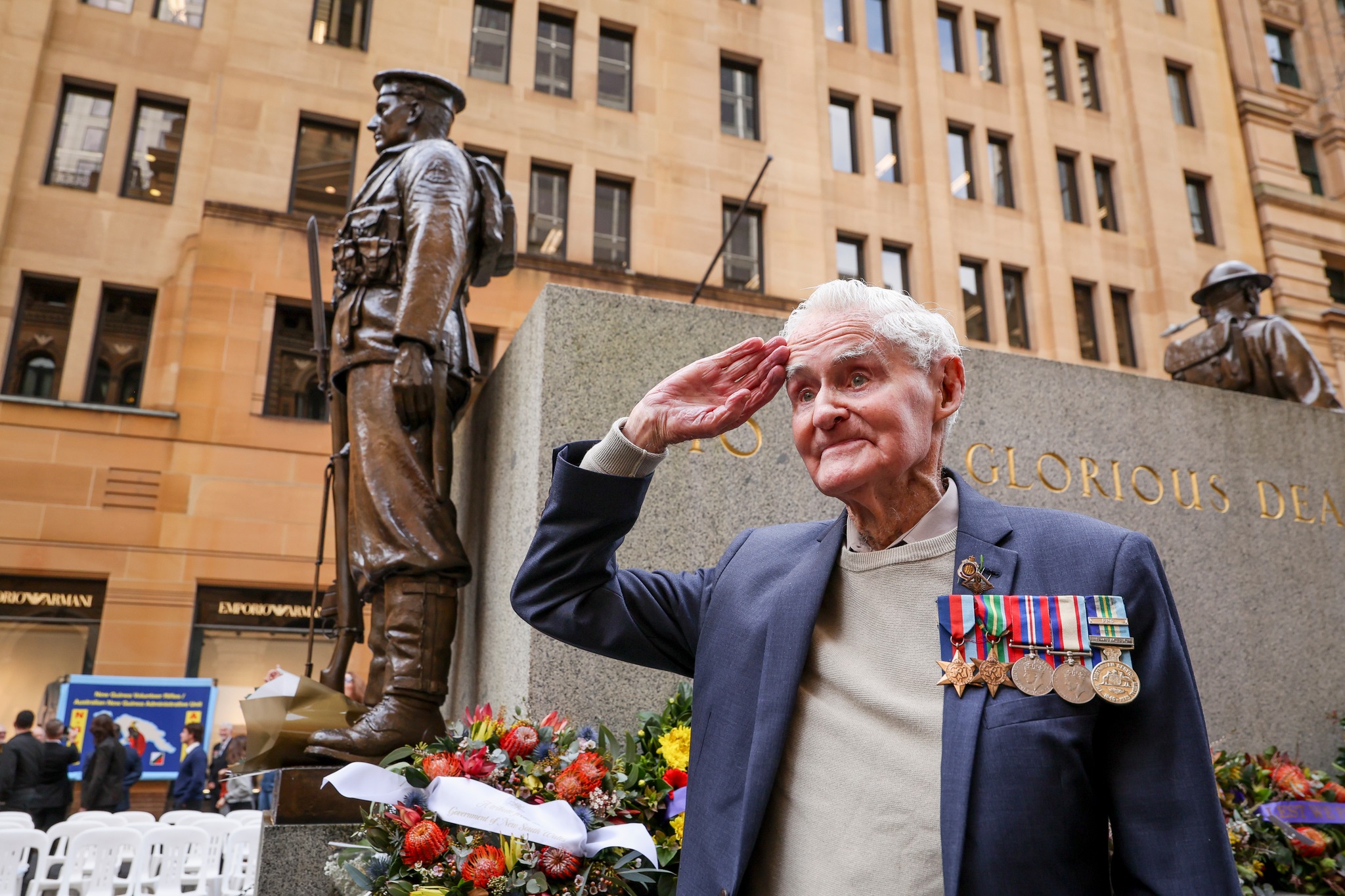
Robert MacArthur in front of The Cenotaph in Martin Place. Photo: RSL NSW
RAN Lieutenant Commander Tamara Sloper-Harding OAM, Vice-President Avalon Beach RSL Sub-Branch stated:
Today marks 80 years since the end of the Second World War. Victory in the Pacific Day is special because it marks the moment the war truly ended for Australia and our region, bringing peace, reuniting families and honouring the sacrifices made so future generations could live in freedom.
I acknowledge the Garigal people, the traditional custodians of the land in and around Pittwater and pay respect to their elders, past, present and emerging.
My name is Tamara Sloper-Harding, I am one of the Vice Presidents of the Avalon Beach RSL Sub Branch, and I would like to welcome you to the RSL NSW Northern Beaches District commemoration of the Victory of the Pacific. It is wonderful to have our local MP, Jaqui Scruby and our Mayor, Sue Heins, with us today. I extend a special welcome to our fellow Northern Beaches District Sub Branches and our guest speaker, Lcdr Shaun Mendez.
Unfortunately, Avalon Beach Sub Branch President CDRE Richard Menhinick AM, CSC is out of the country at the moment, and I, as the junior officer, was asked to step in for today’s service! Richard is here in spirit and has had a lot of input into planning this event.
We are so fortunate in Avalon to have the support of our school students and cadets at all of our commemorations. For younger people VP Day can seem like distant history. So it is important that we focus on storytelling and show the human side rather than just dates and facts.
World War II, and many wars that followed, weren’t fought by nameless men and women. They were young Australians – some barely older than the high school students here today – they left home, faced danger, and often never came back - or came back bearing the invisible scars of war. Peace was hard won; conflict comes with a huge human cost. Australia's involvement in the Pacific, as we stood by our neighbours, shaped our place in the world today.
Due to the weather, we are holding this short ceremony here undercover, but it should not detract from the solemnity of this special occasion nor the reflection on the joy and relief felt by our fellow Australians 80 years ago today at the end of the war in our region.
______________________________________________
Mater Maria Catholic College students reads the prayers, Prayer for the Fallen and Prayer for the Services.
Hymn: Abide With Me
Tamara Sloper-Harding OAM, Vice-President Avalon Beach RSL Sub-Branch, in introducing the VP Day Commemorative Addressee, stated
''As our members know I am constantly talking about the importance of welcoming the next generation of servicemen and women to the RSL. It is essential for both the longevity of the League and for us to fulfil our charitable purpose of caring for veterans and their families. Avalon Beach Sub Branch is blessed to have a large number of contemporary veterans in our membership. I am often asked where they are – at meetings or at commemorations like this. They are at work and some are on active duty, deployed around the globe on land, air, and sea. What an excellent connection they are for us in today’s ADF. They are perfectly placed to keep us abreast of current issues and challenges and to prepare us for the best ways to support our veterans into the future.
Speaking of the next generation of potential RSL Sub Branch members………..
It is my honour to introduce our guest speaker to you today.
‘Lieutenant Commander Shaun Mendez joined the Royal Australian Navy in 2010 and attended the Australian Defence Force Academy from 2011-2013, before becoming fully qualified as a Maritime Warfare Officer in 2015. LCDR Mendez has focussed his career on undersea warfare, specialising in both geospatial intelligence and mine warfare operations. Throughout his career he has served on His Majesty’s Ships Choules, Maryborough, Shepparton, Mermaid, Melville and Leeuwin. LCDR Mendez is currently posted as the Commanding Officer of the Australian Mine Warfare Team, which specialise in the operation of remote and autonomous systems and is responsible for Australia’s deployable Mine-countermeasure and Maritime Mining capabilities.’''
Ladies and gentlemen I give you LCDR Shaun Mendez RAN, HMAS WATERHEN
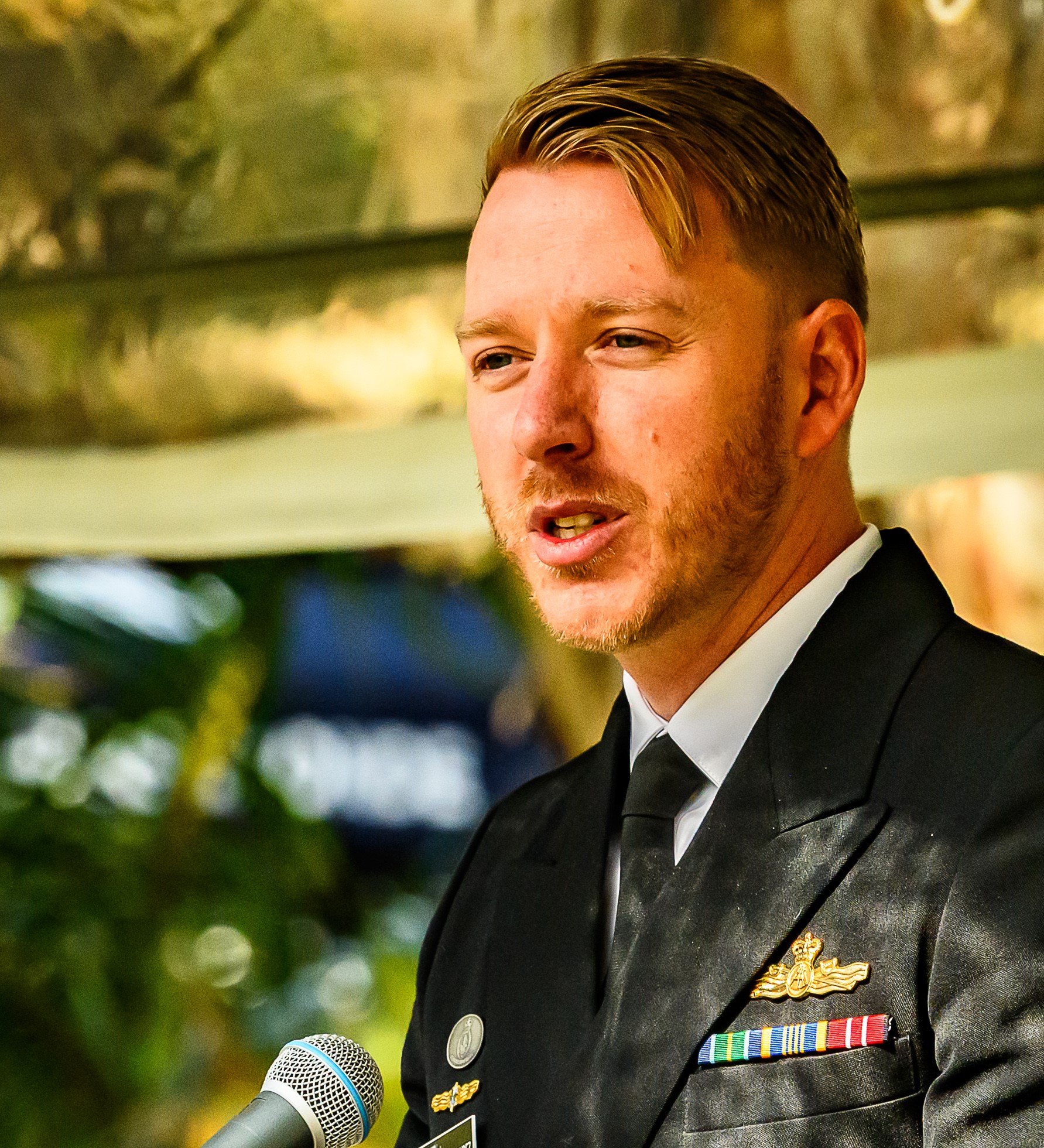
Photo: Michael Mannington OAM, Community Photography.
Wreath Laying and the lament, played by Graham Mackay, were followed by the ode
Wreath Laying
Pittwater MP Jacqui Scruby
Mayor Sue Heins
Superintendent John Duncan on behalf of Northern Beaches Local Area command
President of Pittwater RSL Deborah Carter on behalf of Northern Beaches District Council
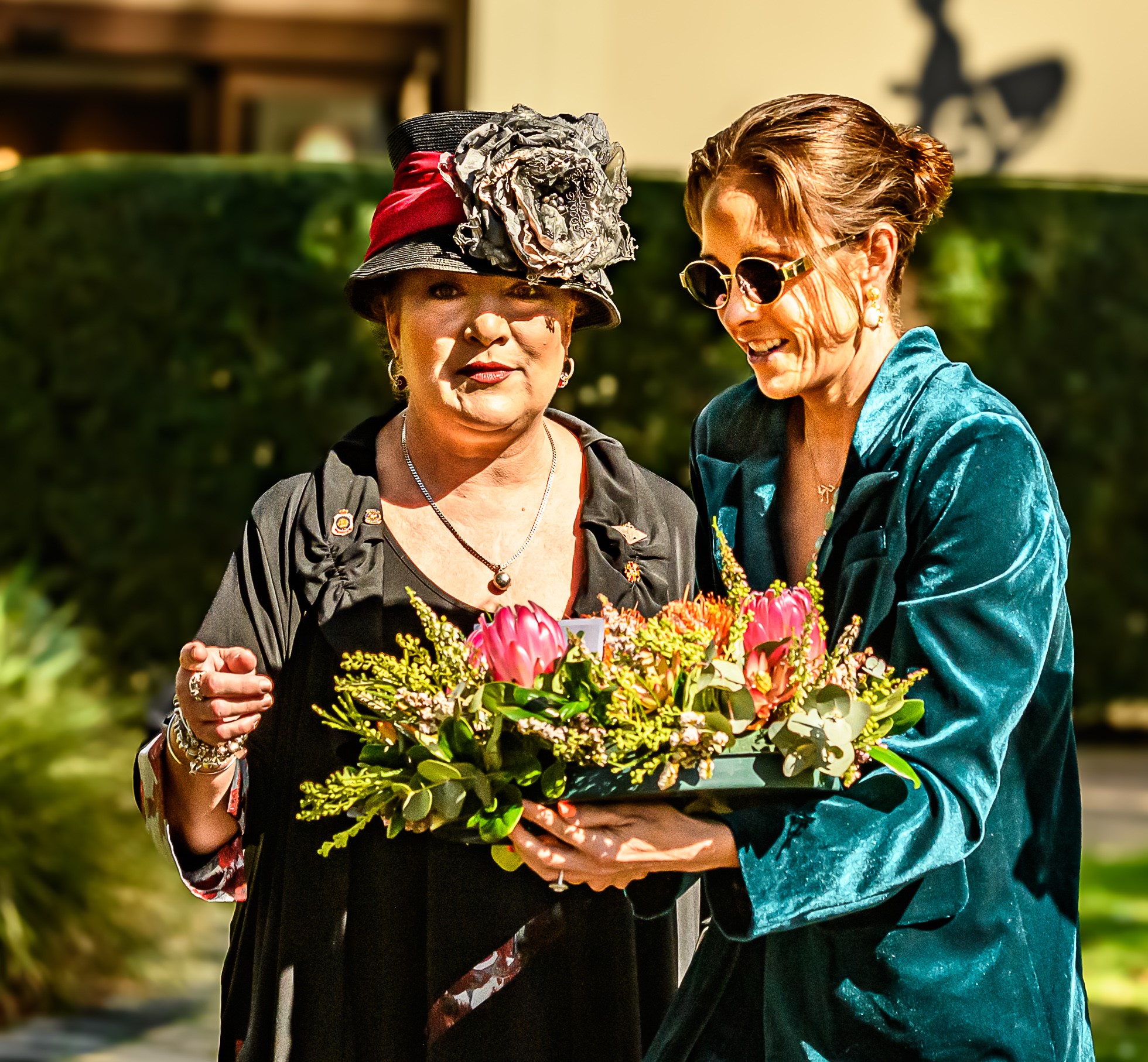
Pittwater MP Jacqui Scruby. Photo: Michael Mannington OAM, Community Photography
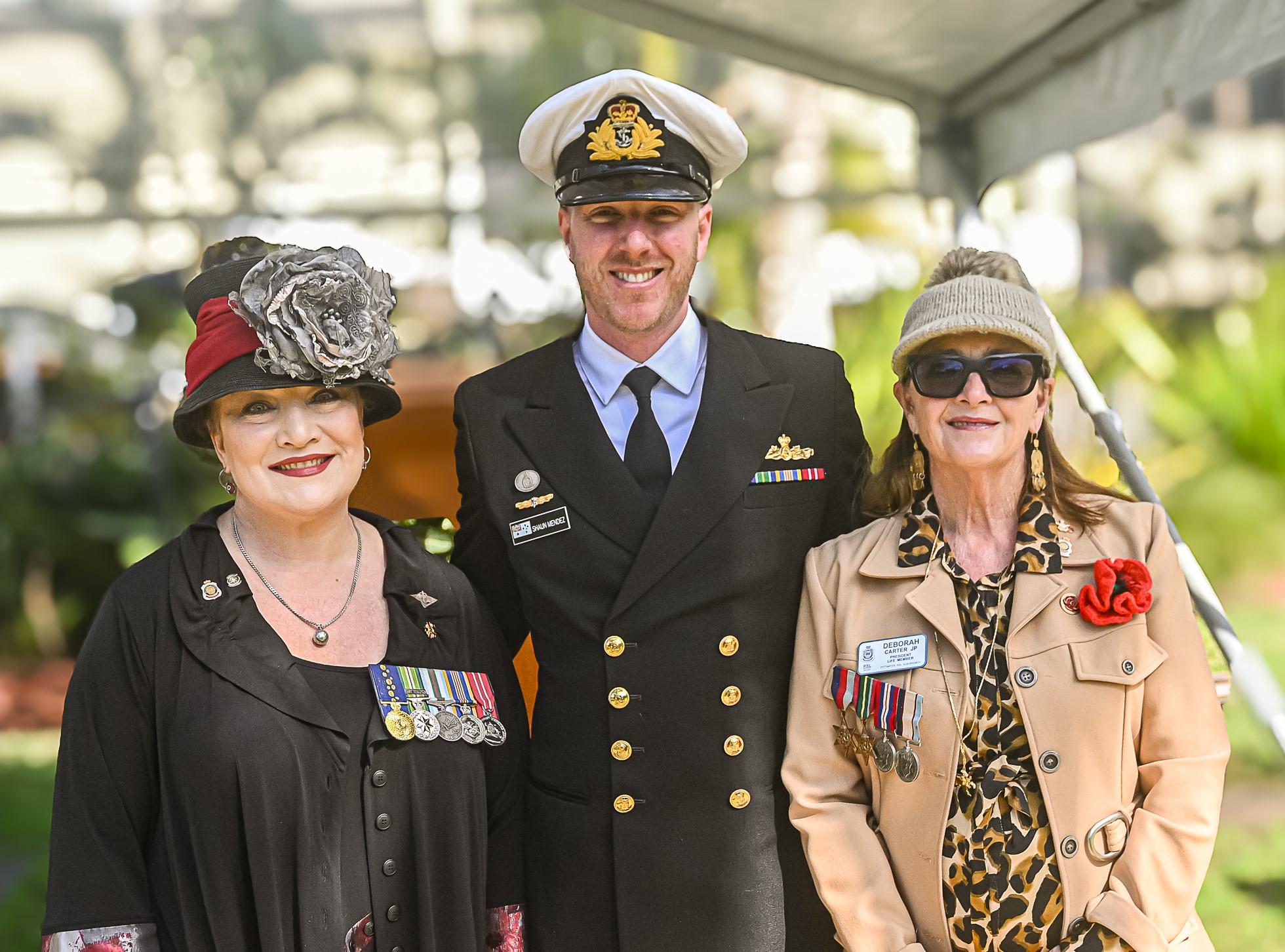
RAN Lieutenant Commander Tamara Sloper-Harding OAM, Vice-President Avalon Beach RSL Sub-Branch, Deborah Carter, LCDR Shaun Mendez RAN, HAMS Waterhen. President Pittwater RSL Sub-Branch, Photo: Michael Mannington OAM